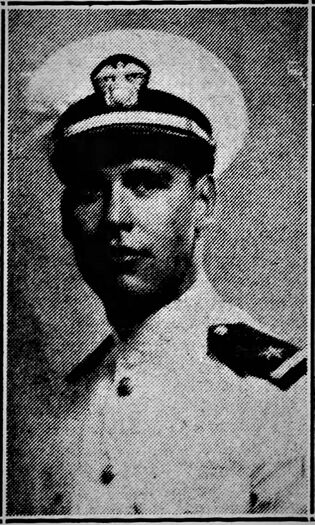RICHARD L. HELM, LCDR, USN
Richard Helm '39
Lucky Bag
From the 1939 Lucky Bag:
RICHARD L. HELM
Harrisburg, Pennsylvania
Blatz, Dick
"Rally round," and Blatz is on the spot. From the capital city of Pennsylvania, our whirl-wind of speech. Tutored in the political atmosphere of Harrisburg, he has become the Naval Academy's most consistent "bull sessionist"—and occasionally he passes out some good dope. His undaunting courage and will to win against surmounting odds have successfully carried him through his one major tussle with the Steam Department. Though one of the finer Spanish athletes of the Class of '39, he does find some time to devote to athletics. Blatz does not consistently drag, yet no hop would be complete without his beaming face. There never was a more congenial roommate, and we know he will be a success in whatever field of endeavor he chooses.
Manager Football 4, 3; Battalion Track; Reception Committee; 1 Stripe.

RICHARD L. HELM
Harrisburg, Pennsylvania
Blatz, Dick
"Rally round," and Blatz is on the spot. From the capital city of Pennsylvania, our whirl-wind of speech. Tutored in the political atmosphere of Harrisburg, he has become the Naval Academy's most consistent "bull sessionist"—and occasionally he passes out some good dope. His undaunting courage and will to win against surmounting odds have successfully carried him through his one major tussle with the Steam Department. Though one of the finer Spanish athletes of the Class of '39, he does find some time to devote to athletics. Blatz does not consistently drag, yet no hop would be complete without his beaming face. There never was a more congenial roommate, and we know he will be a success in whatever field of endeavor he chooses.
Manager Football 4, 3; Battalion Track; Reception Committee; 1 Stripe.
Loss
Richard was lost when USS Pickerel (SS 177) was sunk by Japanese vessels north of Honshū on April 3, 1943.
Other Information
Graduated from John Harris High School and attended Bullis School.
His father was Hiram, a manager of a plumbing and heating company, mother Lotta, brother Henry, and his sister Sarah who received her commission as an ensign in the Naval Reserve Nurses Corps in 1943.
From Harrisburg Telegraph, October 7, 1942
Sub Raids on Japs Lots of Fun
City Sailor Anxious to Get Back
“You get we’re going to win.”
A Wide, boyish, infectious smiles backs up those words from the lips of a young Harrisburger just back from the battles in the Pacific. …
It’s a boy’s smile but it’s a man talking.
You know he knows what he’s talking about.
Lieut. Helm … is just back from submarine service off Australia, Java, the Dutch West Indies and the Philippines.
He can’t go into detail but he’ll tell you with a broad, confident grin that “we sank plenty of Japanese ships.”
“Ever see any Japs,” you ask him.
“Sure.”
“Where?”
“Floating around after we sink their ships.”
“Any actually fighting?”
“Yes, we’ve seen ‘em through the periscope when the Dutch East Indies, Java, and so on were being invaded.”
Lieut. Helm picked the submarine service because he “wanted to see action.” And has!
There were four youths rooming together at Annapolis. Three are aboard submarines, one is an airplane pilot.
“Sort of over and under?” you say and he grins.
“That’s it.”
This young Lieutenant can’t talk about the battles but you can guess and not be wrong that he has been in the thick of many an engagement spread across the front pages of the Harrisburg Telegraph.
Out to Win
He tells you that the morale is “of the best” in the Navy and among all fighting men and you know he’s telling the truth. The smile backs up every statement.
“We have a lot of fun,” he said. “It’s just like a football team out to win. We make little bets about how many ships we’ll get when we go out. There’s a lot of good-natured bantering and nobody worries about anything except to sink the Japs.”
Asked if there’s ever the fear of smothering in a submarine (this writer has claustrophobia), he says:
“Never. We just don’t think about that. It gets hot sometimes if we’ve been down for a long time, that’s all. But the air is well-conditioned and we know as long as we don’t get hit, everything’s all right. We know how to go down and how to come up, provided everything clicks.”
Home First Time in 15 Months
Lieut. Helm is back in the United States for the first time in 15 months and is having a grand time but all the same is “mighty anxious to get back and see the gang.”
He was in the Philippines when the Japs bombed Pearl Harbor. From then on he has been having the action he craved back in the not too-far-away Annapolis days.
He has had shore leave in the Dutch East Indies and Western Australia and is enthusiastic about the “fine people, especially in Australia.”
The Smile Sticks
The trip across the Pacific was made by submarine and the return will be the same way.
One, talking with Lieut. Helm, cannot but wish that civilian morale was half as good as that which exists among the fighting men, who are really neighbors with danger.
His chin is up. There’s a smile that won’t come off. There’s confidence in every syllable.
The Lieut. Can’t answer half our questions but says:
“Wait’ll after the war; I’ll have some real ones for you.”
O. K., young fellow with the smile in your eye and the chip on your shoulder, don’t make it too long.
His parents were listed as next of kin. He has a memory marker in Pennsylvania.
Photographs
Silver Star
From Hall of Valor:
The President of the United States of America takes pride in presenting the Silver Star (Posthumously) to Lieutenant Richard Lintner Helm (NSN: 0-82729), United States Navy, for conspicuous gallantry and intrepidity in action in the performance of his duties in the U.S.S. PICKEREL (SS-177), during the first five War Patrols of that Submarine in enemy waters from 8 December 1941 to 26 August 1942. As Assistant Torpedo Data Computer Operator, his keen understanding of fire control equipment and proficiency in operating the Torpedo Data Computer were of invaluable assistance to his Commanding Officer in conducting successful attacks which resulted in the sinking of two enemy freighters, totaling 10,000 tons. His coolness and devotion to duty contributed directly to the success of his vessel in evading enemy countermeasures. His conduct throughout was an inspiration to the officers and men in his ship and were in keeping with the highest traditions of the United States Naval Service.
General Orders: Commander in Chief Pacific: Serial 03958 (May 12, 1945)
Action Date: December 8, 1941 - August 26, 1942
Service: Navy
Rank: Lieutenant
Company: Assistant Torpedo Data Computer Operator
Division: U.S.S. Pickerel (SS-177)
Memorial Hall Error
His memorial marker and a listing of losses in that Pacific theater in Honolulu both list him as a LCDR. Believe his was likely a posthumous promotion; the Register of Commissioned and Warrant Officers of the United States Navy and Marine Corps of 1945 lists him as a Lieutenant. (Have not been able to find the 1946 edition of this document.)
The "Register of Commissioned and Warrant Officers of the United States Navy and Marine Corps" was published annually from 1815 through at least the 1970s; it provided rank, command or station, and occasionally billet until the beginning of World War II when command/station was no longer included. Scanned copies were reviewed and data entered from the mid-1840s through 1922, when more-frequent Navy Directories were available.
The Navy Directory was a publication that provided information on the command, billet, and rank of every active and retired naval officer. Single editions have been found online from January 1915 and March 1918, and then from three to six editions per year from 1923 through 1940; the final edition is from April 1941.
The entries in both series of documents are sometimes cryptic and confusing. They are often inconsistent, even within an edition, with the name of commands; this is especially true for aviation squadrons in the 1920s and early 1930s.
Alumni listed at the same command may or may not have had significant interactions; they could have shared a stateroom or workspace, stood many hours of watch together… or, especially at the larger commands, they might not have known each other at all. The information provides the opportunity to draw connections that are otherwise invisible, though, and gives a fuller view of the professional experiences of these alumni in Memorial Hall.
October 1939
June 1940
November 1940
April 1941

The "category" links below lead to lists of related Honorees; use them to explore further the service and sacrifice of alumni in Memorial Hall.


